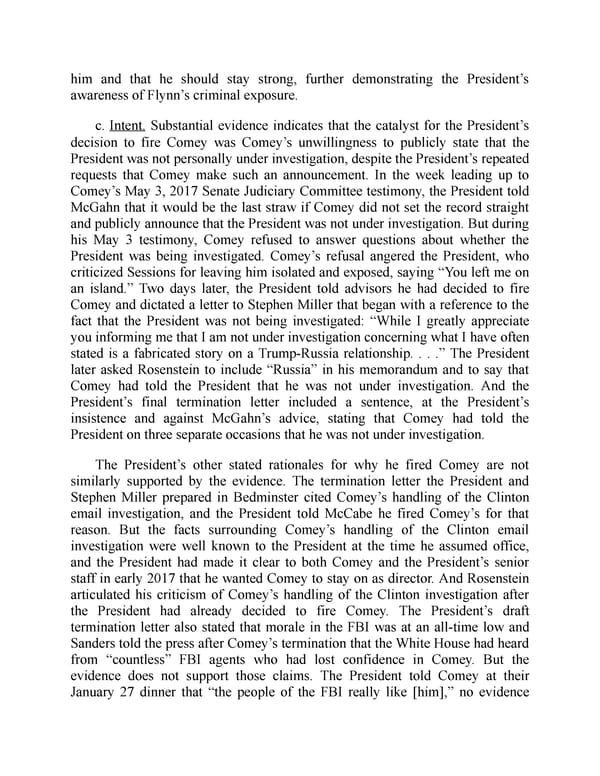him and that he should stay strong, further demonstrating the President’s awareness of Flynn’s criminal exposure. c. Intent. Substantial evidence indicates that the catalyst for the President’s decision to fire Comey was Comey’s unwillingness to publicly state that the President was not personally under investigation, despite the President’s repeated requests that Comey make such an announcement. In the week leading up to Comey’s May 3, 2017 Senate Judiciary Committee testimony, the President told McGahn that it would be the last straw if Comey did not set the record straight and publicly announce that the President was not under investigation. But during his May 3 testimony, Comey refused to answer questions about whether the President was being investigated. Comey’s refusal angered the President, who criticized Sessions for leaving him isolated and exposed, saying “You left me on an island.” Two days later, the President told advisors he had decided to fire Comey and dictated a letter to Stephen Miller that began with a reference to the fact that the President was not being investigated: “While I greatly appreciate you informing me that I am not under investigation concerning what I have often stated is a fabricated story on a Trump-Russia relationship. . . .” The President later asked Rosenstein to include “Russia” in his memorandum and to say that Comey had told the President that he was not under investigation. And the President’s final termination letter included a sentence, at the President’s insistence and against McGahn’s advice, stating that Comey had told the President on three separate occasions that he was not under investigation. The President’s other stated rationales for why he fired Comey are not similarly supported by the evidence. The termination letter the President and Stephen Miller prepared in Bedminster cited Comey’s handling of the Clinton email investigation, and the President told McCabe he fired Comey’s for that reason. But the facts surrounding Comey’s handling of the Clinton email investigation were well known to the President at the time he assumed office, and the President had made it clear to both Comey and the President’s senior staff in early 2017 that he wanted Comey to stay on as director. And Rosenstein articulated his criticism of Comey’s handling of the Clinton investigation after the President had already decided to fire Comey. The President’s draft termination letter also stated that morale in the FBI was at an all-time low and Sanders told the press after Comey’s termination that the White House had heard from “countless” FBI agents who had lost confidence in Comey. But the evidence does not support those claims. The President told Comey at their January 27 dinner that “the people of the FBI really like [him],” no evidence
 Mueller Report PDF Page 342 Page 344
Mueller Report PDF Page 342 Page 344